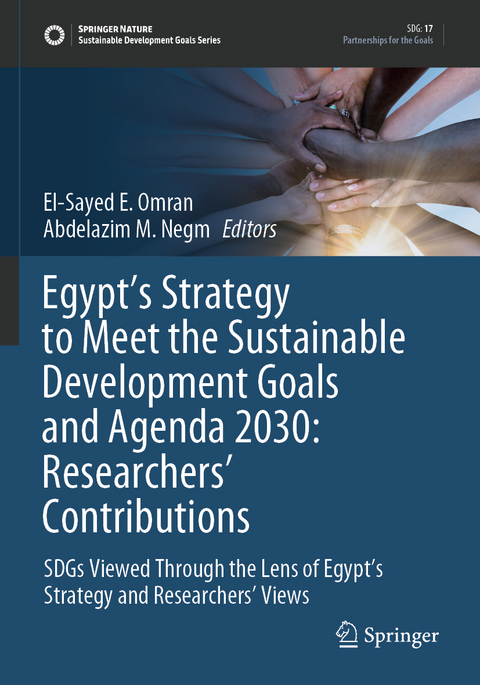
Egypt’s Strategy to Meet the Sustainable Development Goals and Agenda 2030: Researchers' Contributions
Springer International Publishing (Verlag)
978-3-031-10678-1 (ISBN)
This book focuses on Egypt as a representative example of emerging economies struggling to achieve their sustainable development goals (SDGs). The Egyptian government has launched Egypt's Vision 2030 in line with the 2030 Agenda, also known as the Sustainable Development Strategy (SDS), which encompasses the economic, social and environmental dimensions of development. It is under the SDS that all development plans in Egypt are incorporated while at the same time being strongly guided by the SDGs. Aware of the principle of shared but differentiated responsibility, Egypt also recognizes that fundamental challenges remain, despite a strong willingness to achieve the SDGs. High birth rates, brain drain phenomena, water scarcity, migration, discrimination against women and girls, a growing informal sector and instability in neighboring states (especially Libya and Syria) are only some of the many hindrances to sustainable development.
In order to address thesechallenges, Egypt relies heavily on the SDGs, which are aimed at transforming our world. Although there is an urgent need for a drastic change in the way we use the Earth, the question arises as to whether the SDGs are sufficient to facilitate such a transformation. This book explores the key environmentally related Sustainable Development Goals (SDGs) and offers a cutting-edge assessment of current progress with a view to reaching these objectives by 2030. The book highlights some of the key findings and ideas for how research may help achieve the 17 Sustainable Development Goals in enterprises. The book provides a useful framework that can help and aid the Egyptian government to assess the many goals and targets outlined in the 2030 Agenda. The analysis of Egypt can be used as a blueprint for other developing nations and globally in order to guide policy toward achieving the SDGs. Covering food security, water resilience, climate change, agronomics, rural life, environmental impact assessment as a tool for measuring the achievement of the goals, Egyptian education, the COVID-19 pandemic, cultural and societal dimensions, this book will be of great interest to students and scholars of sustainable development and climate change, as well as practitioners and policymakers involved in sustainable development and disaster management.
Chapter 1. Introduction to "Insights into Egypt's Strategy to Meet the Sustainable Development Goals and Agenda 2030: Researchers Contributions" (El-Sayed Ewis Omran).- Chapter 2. Overview of the Poverty, Food Security and Nutrition Situation in Egypt (Mona A. Outhman).- Chapter 3. Long-term control of desertification: Is organic farming superior to conventional? Soil and established arid cultivation practices at SEKEM, Egypt (Lorenz Huebner).- Chapter 4. The Effect of COVID-19 on the Egyptian Education System and the Role of Digitalization (Marwa Biltagy).- Chapter 5. Culture and Principles of Equity and Gender Equality as a Basis of Holistic Sustainable Development at SEKEM, Egypt (Lorenz Huebner).- Chapter 6. Integrated Hydrological Modeling and Geoinformatics for Harvesting and Simulating Mountain torrents on the Area Stretching between Port Sudan and Ras Bennas, Red Sea (El-Sayed E. Omran).- Chapter 7. Role of Green Energy in Sustainable Development in Egypt (Nadia M. Eshra).- Chapter 8. Resources of the Renewable Energy in Egypt (Nadia M. Eshra).- Chapter 9. Utilizing Renewable Energy as a means to Achieve SDGs (Raad H. S. Al-Jibouri).- Chapter 10. Economic Growth, Employment and Decent Work as a Sustainable Development Policy for all (Harb A. El. Hasseen El-bardisy).- Chapter 11. Proposed Guidelines For Planning Of Egyptian Fishing Ports (Mahmoud Sharaan).- Chapter 12. The Impact of Human-Induced in Mining Operations on the Increased Risk of Torrents in the Wadi Allaqi Basin (Mohamed E. Dandrawy).- Chapter 13. Climate Considerations in the Planning and Sustainability of Egyptian Cities (El-Sayed E. Omran).- Chapter 14. Life Under Lake Nasser: Water Quality As A Means to Achieving The Egypt's Agenda 2030 (El-Sayed E. Omran).- Chapter 15. Soil-Water Properties for Reduce Land Degradation Along the High Dam Lake, Egypt (El-Sayed E. Omran).- Chapter 16. Update, Conclusions, and Recommendations to "Egypt's Strategy to Meet the Sustainable Development Goals and Agenda 2030" (El-Sayed E. Omran).
| Erscheinungsdatum | 05.02.2024 |
|---|---|
| Reihe/Serie | Sustainable Development Goals Series |
| Zusatzinfo | X, 314 p. 136 illus., 132 illus. in color. |
| Verlagsort | Cham |
| Sprache | englisch |
| Maße | 178 x 254 mm |
| Gewicht | 618 g |
| Themenwelt | Naturwissenschaften ► Biologie ► Ökologie / Naturschutz |
| Naturwissenschaften ► Geowissenschaften ► Hydrologie / Ozeanografie | |
| Technik ► Lebensmitteltechnologie | |
| Schlagworte | 2030 Egypt's SDGs Agenda • Agroeconomical • Climate Change and Life on Land • Cultural and Societal Dimensions • Egyptian education • Environmental Impact Assessment • Food Security and Fishing Ports • Green and Renewable Energy • Sustainable Development Goals • water resilience |
| ISBN-10 | 3-031-10678-4 / 3031106784 |
| ISBN-13 | 978-3-031-10678-1 / 9783031106781 |
| Zustand | Neuware |
| Haben Sie eine Frage zum Produkt? |
aus dem Bereich


